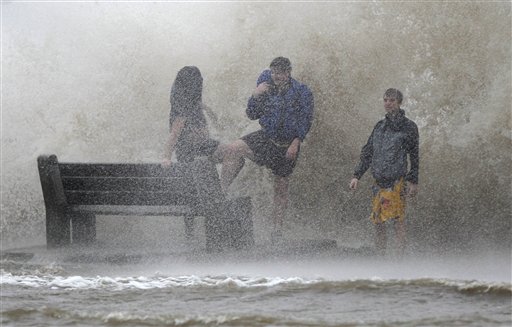Hurricane Isaac spun into the southern Louisiana coast late Tuesday, sending floodwaters surging and unleashing fierce winds as residents hunkered down behind boarded-up windows. New Orleans calmly waited out another storm on the eve of Hurricane Katrina’s seventh anniversary, hoping the city’s strengthened levees will hold.
Isaac, a massive storm spanning nearly 200 miles from its center, made landfall at about 6:45 p.m. near the mouth of the Mississippi River. But it was zeroing in on New Orleans, about 75 miles to the northwest, turning streets famous for all-hours celebrations into ghost boulevards.
The storm drew intense scrutiny because of its timing — just before the anniversary of the hurricane that devastated that city, while the first major speeches of the Republican National Convention went on in Tampa, Fla., already delayed and tempered by the storm.
While many residents stayed put, evacuations were ordered in low-lying areas of Louisiana and Mississippi, where officials closed 12 shorefront casinos.
By late Tuesday, more than 200,000 homes and businesses had lost power.
Ed Rappaport, deputy director of the National Hurricane Center, said Isaac’s core would pass west of New Orleans with winds close to 80 mph and head for Baton Rouge.
“On this course, the hurricane will gradually weaken,” Rappaport said Tuesday night from the Miami-based center. He said gusts could reach about 100 mph at times, especially at higher levels which could damage high-rise buildings in New Orleans.
As Isaac neared the city, there was little fear or panic. With New Orleans’ airport closed, tourists retreated to hotels and most denizens of a coastline that has witnessed countless hurricanes decided to ride out the storm.
“Isaac is the son of Abraham,” said Margaret Thomas, who was trapped for a week in her home in New Orleans’ Broadmoor neighborhood by Katrina’s floodwaters, yet chose to stay put this time. “It’s a special name that means ‘God will protect us’.”
Officials, chastened by memories and experience, advised caution.
“We don’t expect a Katrina-like event, but remember there are things about a Category 1 storm that can kill you,” New Orleans Mayor Mitch Landrieu said, urging people to use common sense and to stay off any streets that may flood.
Tens of thousands of people were told to leave low-lying areas, including 700 patients of Louisiana nursing homes, but officials decided not to call for mass evacuations like those that preceded Katrina, which packed 135 mph winds in 2005.
Isaac also promised to test a New Orleans levee system bolstered after the catastrophic failures during Hurricane Katrina. But in a city that has already weathered Hurricane Gustav in 2008, calm prevailed.
Young, who lives in a new, two-story home built to replace the one destroyed by Katrina, said she wasn’t worried about the levees.
While far less powerful than Katrina, Isaac posed similar political challenges, a reminder of how the storm seven years ago became a symbol of government ignorance and ineptitude.






